
Juan Luis Guerra Seijas is a Dominican musician, singer, composer, and record producer. He has sold 15 million records worldwide, making him one of the best-selling Latin music artists. Throughout his career, he has won numerous awards including 24 Latin Grammy Awards, three Grammy Awards, and one Latin Billboard Music Award. He won 3 Latin Grammy Awards in 2010, including Album of the Year. In 2012, he won the Latin Grammy Award for Producer of the Year.

Mudanza y Acarreo is the second album by songwriter and musician Juan Luis Guerra. The album is widely known for making Guerra and 440 famous, and launching to national fame the group within their native Dominican Republic. It was the first album recorded with Mariadalia Herandez as a member of the band. With this record, the group got radio airplay for the first time with songs like "Elena" and "Por eso Ahora" in the Dominican Republic. "Si tu te vas" is considered their first hit and was included in the Greatest Hits compilation Grandes Éxitos Juan Luis Guerra y 440 (1995) as bonus track.

Ni Es lo Mismo Ni Es Igual is the eighth studio album recorded by Dominican singer-songwriter Juan Luis Guerra and his backup vocals 4–40. It was released by Karen Records on 15 December 1998 and distributed by PolyGram Latino. It was Guerra's comeback album after four years of silence, out of the public eye and since his conversion to Christianity. It was his first studio album since Fogarate (1994). The album production and songwriting were done by Guerra. The album was supported by the release of four official singles: "Mi PC", "Palomita Blanca", "El Niagara en Bicicleta" and "La Hormiguita". Two singles were released as promotional singles: "Vale La Pena" and "Quisiera".
"La Calle" is a song written, produced and performed by singer Dominican Republic Juan Luis Guerra and Colombian Juanes. The song was chosen as the fourth single from the eleventh album by Juan Luis Guerra, A Son de Guerra released for airplay on 1 September 2010.
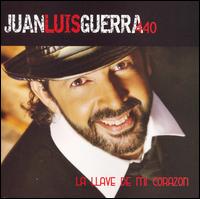
La Llave de Mi Corazón is the 10th studio album recorded by Dominican singer-songwriter Juan Luis Guerra, It was released by EMI Televisa Music on March 20, 2007. It was Guerra's first album to contain songs in English since his 1994 recording of Fogarate. The album contains fusions of mambo and tropical rhythms that Guerra himself defined as "Mambo merengue". Its production and musical structure of album is based on merengue, bachata and salsa and encompasses elements of Blues, Son, Jazz, Mambo and Bossa Nova. The album was written, arranged and produced by Juan Luis Guerra and according to the artist is his most romantic album. It is composed of four merengues, two bachatas, three romantic songs and two salsas.

Ojalá Que Llueva Café is the fourth studio album by Dominican singer-songwriter Juan Luis Guerra released in 1989 by Karen Records. It is considered one of his most emblematic and important albums. The album set the musical path for his later albums, re-formulating Dominican merengue and bachata music through the contemporary elements of pop, rock, salsa, or jazz. Incorporating socially conscious lyrics with danceable merengues and romantic-poetic bachatas, the album is considered one of the most important albums of his discography.
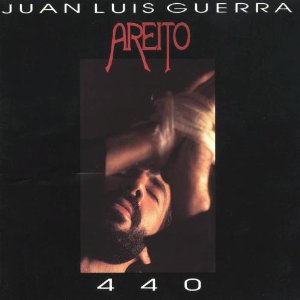
Areíto is the sixth album by Juan Luis Guerra with his band 440, released on 8 December 1992, by Karem Records. The album, meant to be a tribute to the indigenous tribes of the Dominican Republic, is named after a dance that the aboriginal inhabitants of the Greater Antilles (Taínos) accompanied with songs during their festivals and religious rites. The album contains twelve tracks including "Cuando te Beso", interpret by Santo Domingo Philharmonic Orchestra. Congolese musician Diblo Dibala played guitar on the song "El Costo de la Vida", which was a Spanish cover of his own soukous song "Kimia Eve", while the last track on the album, "Naboria daca, mayanimacaná", is sung in Arawak, the language of the Taíno people. Areíto was originally set to be released in early April 1992, but was first delayed to the end of October 1992 and was finally released on 8 December 1992.
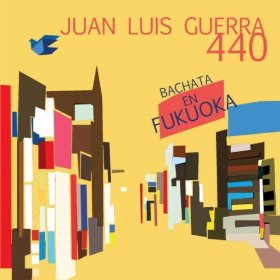
"Bachata en Fukuoka" is the first single released by Dominican singer-songwriter Juan Luis Guerra for his album A Son de Guerra. It reached No. 1 on the Hot Latin Tracks chart in 2010, the second bachata song in the year to do so.

A Son de Guerra, sometimes referred to as Asondeguerra, is the 11th studio album recorded by Dominican singer-songwriter Juan Luis Guerra, It was released by Capitol Latin on June 8, 2010. The album contains 11 tracks, and its musical structure and production are based on Merengue, Bachata, Son, Salsa, experimenting and incorporating elements of jazz, blues, funk, cumbia, rock, reggae, rap, and mambo. Lyrical themes on the album include protest against political corruption, immigration, love and romance. Featured appearances include Juanes and Chris Botti. For many fans and critics alike, it's his album with the most social content and strong social criticism since his 1992's Areito.

"Mi PC" is a song by Dominican Republic singer-songwriter Juan Luis Guerra and his band 4-40 from his eighth studio album, Ni Es lo Mismo Ni Es Igual (1998). The song was released as the lead single from the album in November 1998 by Karen Records. The song was written and produced by Guerra. It is a pop merengue track in which Guerra uses computer terminology to narrate a love story. "Mi PC" was met with positive reactions from music critics who found the lyrics to be clever and its music catchy.
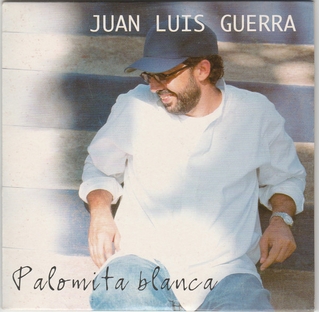
"Palomita Blanca" is a song by Dominican Republic singer-songwriter Juan Luis Guerra and his band 4-40 from his eighth studio album, Ni Es lo Mismo Ni Es Igual (1998). As with the rest of the album, the song was written and produced by Guerra. The song was released as the second single from the album in March 1999 by Karen Records. It is a bachata acoustic ballad about a man who is immensely in love with a woman and refuses to let her go.

"El Niágara en Bicicleta" is a song by Dominican Republic singer-songwriter Juan Luis Guerra and his band 4-40 from his eighth studio album, Ni Es lo Mismo Ni Es Igual (1998). The song was written and produced by Guerra. It was released as the third single from the album in 1999 by Karen Records. A merengue rap song, it sees the protagonist finding himself in a hospital that is in poor condition, based on Guerra's experience in one. The song received positive reactions from three music critics, who praised who praise its music and social conscious lyrics.

Juanes: MTV Unplugged is the second live album of Colombian singer Juanes. It was recorded before a live audience at the New World Symphony Center in Miami Beach, Florida, on February 1, 2012, and was released by Universal Music Latino on May 29, 2012. The album includes featured performances by the Spanish composer Joaquín Sabina and the Brazilian singer Paula Fernandes. The album features rearranged takes on Juanes' hit songs like "Me Enamora", "La Camisa Negra" and "A Dios le Pido". The first single of the live album was released on March 5, 2012, called La Señal, which became a hit in Latin America. The second single was "Me Enamora", with new instrumental arrangements, and was released two days after of the album's release. The album featured three new songs, one of which was a collaboration with Joaquín Sabina. The album debuted at number one on the Billboard Top Latin Albums Chart and won the 2012 Latin Grammy for Album of the Year. This was the third time he won Album of the Year at the Latin Grammys.

Vida (Life) is the twelfth studio album by Puerto Rican recording artist Draco Rosa, released on March 19, 2013 by Sony Music Latin. It consists of 16 duets of Rosa's hits featuring guest artists chosen personally by Rosa himself. This is the first album released by Draco after his non-hodgkin lymphoma cancer diagnosis near his liver on April 25, 2011. It is entitled Vida symbolizing Draco's recovery after his cancer treatment. The album won Album of the Year at the 2013 Latin Grammy Awards and Best Latin Pop Album at the 56th Annual Grammy Awards.

Todo Tiene Su Hora is the 13th studio album by Dominican singer-songwriter Juan Luis Guerra and his band 4.40. It was released on November 11, 2014, by Capitol Latin and was produced by Juan Luis Guerra & Janina Rosado. Like his previous albums, the album is composed by variety of tropical music genres such as bachata, merengue, salsa and son but with different instrumentation normally used in classical music such as strings and violins. Guerra described the album as "innovative" and explored lyrics raging from love and romance to social conscience and protest against political corruption. The record encompassed elements of funk and jazz with merengue and classical music with bachata.
The Dominican singer, songwriter and producer Juan Luis Guerra has released 14 studio albums, two live albums and forty-eight singles. He is one of the best selling Latin artist of all time with more 30 millions of records worldwide. He made his debut with his first studio album Soplando, released in 1984. He later released his second studio album in 1985, Mundanza y Acarreo which was his first national success and marked his first entry at the US Billboard Charts at number seventeen on Billboard Tropical Charts. In 1987, his third studio album Mientras Más Lo Pienso...Tú become his first work to gain international attention in countries such as Venezuela and Puerto Rico. Between this last two albums, it sold over two million copies worldwide.
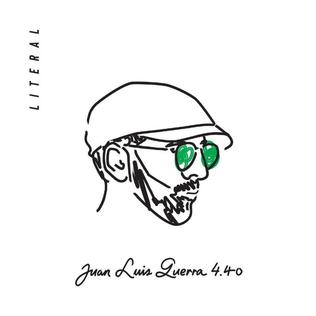
Literal is the 14th studio album by Dominican singer, songwriter and producer Juan Luis Guerra. It was released on 31 May 2019 by Universal Music Latin. Written and produced by Juan Luis Guerra, the album contains eleven tracks and encompasses a variety of tropical genres, such as bachata, merengue, salsa and son along with influences from jazz, gospel, rock and Dominican folk music. The album was co-produced by Guerra's longtime collaboration and musical director Janina Rosado. It has lyrics about romance, love, nostalgia, moving on and protest against corruption.

"Viviré" is a song by Dominican Republic singer-songwriter Juan Luis Guerra released as the second single for his album Fogaraté (1994). It is a Spanish-language adaptation of "Vivi" by Congolese musician Papa Wemba with Guerra writing the song in Spanish. It became his first song to reach number-one on the Billboard Latin Pop Airplay in 1994. At the 1995 Latin Billboard Music Awards, "Viviré" won Tropical/Salsa Song of the Year. It was recognized as one best-performing Latin songs of the year at the 1996 BMI Latin Awards. The music video for the song was directed by Gustavo Garzón and received a nomination for Video of the Year at the 1995 Lo Nuestro Awards. On the review of the album for the Miami Herald, Fernando Gonzalez called the song "the best of the lot". A writer for Music & Media described the track as a Cuban son.
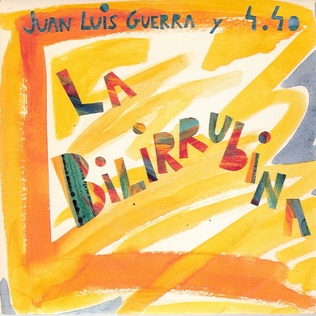
"La Bilirrubina" is a song by Dominican singer-songwriter Juan Luis Guerra. It was written by Guerra and released by Karem Records on 1990 and 1991 in Europe as the second single from his fifth studio album, Bachata Rosa. It was nominated for Record of the Year at 1991 Lo Nuestro Awards. The merengue track is considered one of Guerra's signature songs and most popular. It receive positive reviews and was listed one of the best tracks of the album.
«Carta de Amor» is a salsa song by Dominican singer-songwriter Juan Luis Guerra released in 1990 and served as the lead single from his sixth studio album Bachata Rosa (1990). Track talks about how he writes a letter to his lover in his journal, punctuation marks included. It is the second song of the album along with Como Abeja Al Panal to have salsa approach on the album. It was peaked as a highlight track of the album by Allmusic. It peaked at number 35 on Hot Latin Songs and was included in Guerra's greatest hits album Grandes Éxitos Juan Luis Guerra y 440 (1995).














